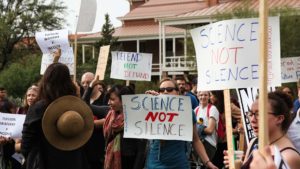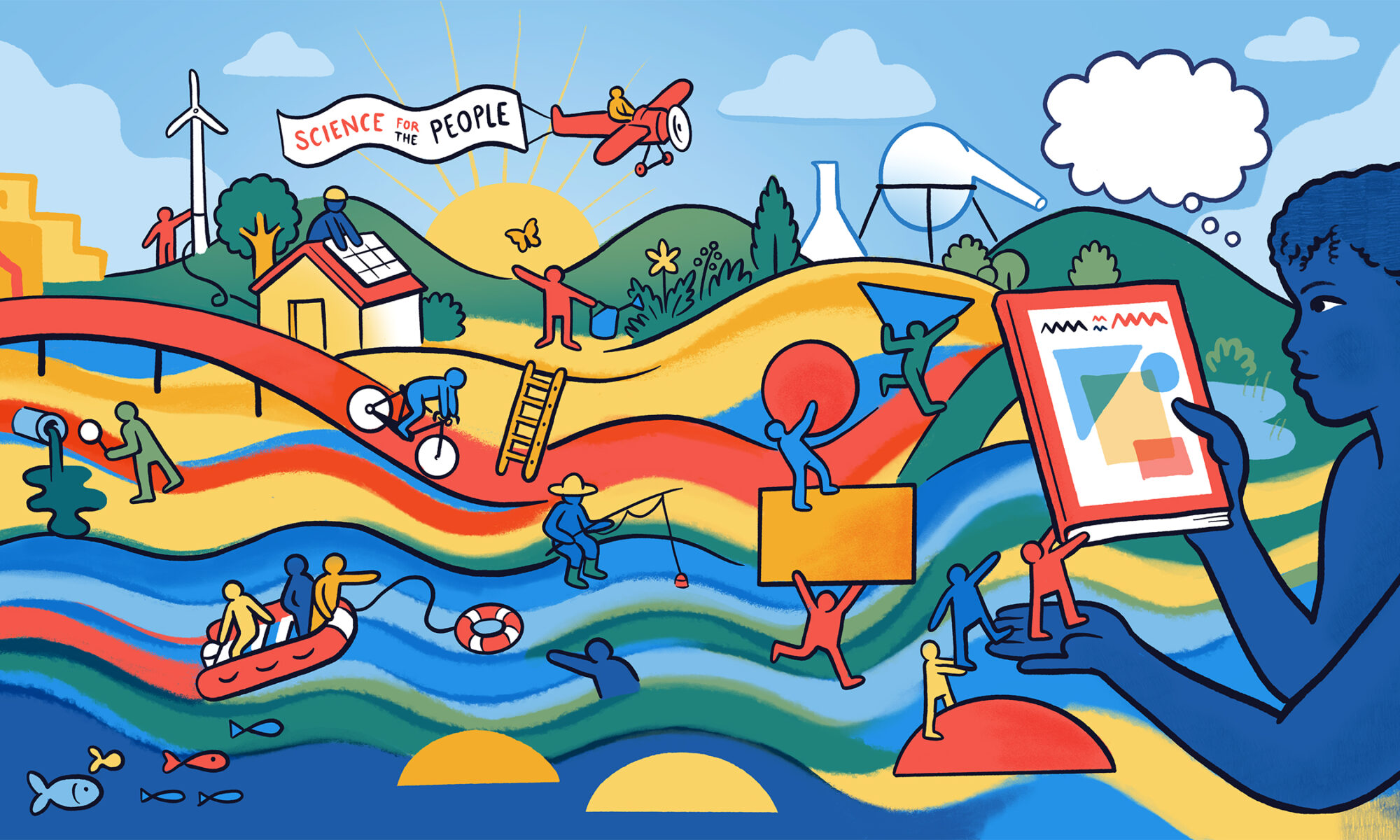
Attacks on Science and Scientists during the Trump Administration and Before
Compiled by Frank Rosenthal for Science for the People
Last updated: May 7, 2020
Although the suppression of scientific information that is inconvenient to political interests began long before the Trump administration, it has intensified in recent years. Scientific advisory panels have been disbanded or restructured to exclude relevant expertise. Information in public reports has been censored. Research grants have been cancelled. Individual scientists have been suppressed or threatened. Some of these actions have likely contributed to the disease and death toll in the COVID19 pandemic.
Articles of most relevance to COVID19
1. Elimination of the National Security Council Pandemic Unit
In May 2018, the National Security Council Directorate for Global Health and Biodefense, which included pandemic experts, was eliminated and merged with the Directorate for Counterproliferation and Biodefense. The office was established in 2014 following the Ebola outbreak, according to its former director “in order to: to do everything possible within the vast powers and resources of the U.S. government to prepare for the next disease outbreak and prevent it from becoming an epidemic or pandemic.” Leading public health and infectious disease specialist Anthony Fauci said, “We worked very well with that office. It would be nice if the office was still there”.
Resources:
2. Defunding science at the CDC
Funding for pandemic preparedness decreased over three presidential administrations. In the last two years, under the Trump administration, it has been somewhat flat, but that is because Congress rejected budget cuts proposed by the White House.
3. Classifying federal agency coronavirus deliberations, thereby restricting public access.
Many high-level federal meetings about the pandemic have been classified as high security by the White House, preventing staffers and public health experts from attending. In this article several Trump administration sources described these procedures as unnecessary and counterproductive.
-
- See news article here.
4. Censoring information from public health experts
The White House has required that all statements by federal public health officials first be cleared by Vice-president Pence before being released to the public.
Resources:
5. Falsehoods, exaggerations, misinformation from government officials about the pandemic
Journalists and fact check organizations have exposed a multitude of false claims by the Trump administration.
Resources:
-
- Fact checking from NBC News
- Fact checking from BBC
- Fact checking from Factcheck.org
- Fact checking from CNN
- Donald Trump’s false equivalence between COVID-19 and influenza
- A similar pattern of misinformation is found with the pandemic and climate change.
6. An overview of how the Trump administration has devalued and ignored science and why this is a threat to an effective response to the pandemic.
Resource:
7. Attacks on air pollution research which endanger public health in the pandemic
In the wake of the COVID-19 crisis, the Trump administration is continuing its attacks on the use of science in settling regulations. In addition, it is relaxing enforcement of air pollution regulations. A recent study found a large increase in the risk of death from COVID-19, with a relatively small increment in particulate air pollution exposure.
8. Attack on the World Health Organization
On April 14, Trump announced that the US was cutting funding to the World Health Organization for a period of 60-90 days, pending an investigation of criticism of their behavior during the COVID-19 pandemic. The WHO is the leading organization coordinating international response to the pandemic. The US provides 9.2% of the total budget of the WHO. Much of Trump’s critique of WHO has been shown to be unfounded, and he himself previously praised WHO’s response to the pandemic.
News stories on canceling US funding of WHO:
-
- Trump Announces Cutoff of New Funding for the World Health Organization over Pandemic Response
- Trump Cuts Funding to World Health Organization During a Global Pandemic
- ‘Short sighted’. Health experts decry Trump’s freeze on U.S. funding for WHO as world fights pandemic
- Fact checking Trump’s Attacks on the WHO
9. Arbitrarily cancelling research on the origin of COVID-19
In late April, 2020, NIH suddenly canceled a grant on how coronaviruses move from bats to humans. The grant was targeted by the Trump administration because it involved joint work with the Chinese Wuhan Institute of Virology. The cancellation of an NIH grant for reasons other than scientific misconduct or financial impropriety is highly unusual and possibly without precedent.
Resource:
10. Removal of COVID scientist whistle-blower from position as agency director
In late April, 2020, Richard Bright, director of the Biomedical Advanced Research and Development Authority, a US agency involved in developing vaccine and drug counter measures against COVID19, was removed from his position, shortly after he raised questions about unproven COVD-19 therapies promoted by Donald Trump. The U.S. Office of Special Counsel found “reasonable grounds to believe” that the action was retaliatory and recommended reinstating Dr. Bright, pending an investigation.
Resources:
11. Censoring CDC guidelines on re-opening the economy
On May 7, the Trump administration interceded to prevent the release of CDC guidelines on how to safely reopen the economy, saying the guidelines were “overly prescriptive”.
Resources:
More general attacks on science
1. Censoring and controlling information from federal agencies
In December 2017 CDC workers were told by administrators that the following seven words were off limits on budget requests: “vulnerable,” “entitlement,” “diversity,” “transgender,” “fetus,” “evidence-based” and “science-based.
Resource:
2. Attacks on air pollution science
Administrators at the EPA appointed by Trump have attacked the use of scientific expertise in setting air pollution standards by disbanding a key scientific panel set up to review air pollution standards, as described in this news story. The members of the panel responded with this letter of protest.
Trump appointees have also removed air pollution scientists from advisory positions and issued a rule that no one who receives EPA funding can be a member of an advisory group. This disqualifies many of the top air pollution scientists in the country. A spokesperson for the EPA said the agency is considering replacing the fired scientists with representatives of the industries being regulated. News stories about these actions can be found here and here.
Under the guise of “transparency in regulatory science” they have also promoted a new rule that would make many studies of air pollution and health ineligible for consideration in setting EPA standards. An analysis of the effect of the new rule on public health can be found here.
3. Disbanding Climate Change Advisory Committee
The 15-person National Climate Change Advisory Committee was established in 2010 with membership including academic, NGO, government and industry representatives It was disbanded by the Trump administration in 2017. The American Association for the Advancement of Science issued this letter protesting the disbanding of the Committee. New York Governor Andrew Cuomo reconvened the Committee in 2018.
4. Many other scientific panels and advisory committees eliminated by the Trump administration
Resource:
5. Suppressing public scientific information
The Trump administration has acted to eliminate information about climate change from publicly available websites.
Resource:
6. Shrinking the federal scientific workforce
The White House administration has reduced the number of scientific workers at federal agencies, using a combination of budget cuts, forced relocations, and demoralization.
Resources:
7. Attacks on Chinese and Chinese-American scientists
Chinese scientists have been unfairly targeted with accusations of espionage. The situation is described in this report from the American Association of University Professors, October 2017.
8. Additional resources from Union of Concerned Scientists
-
- The State of Science in the Trump Era: Damage Done, Lessons Learned, and a Path to Progress (1/23/2019)
- A database on Attacks on Science, listed by agency and type of attack as of 1/20/2017 (scroll to bottom of the page)
- Attacks on Science Put a Generation of Children at Risk (February 11, 2020)
